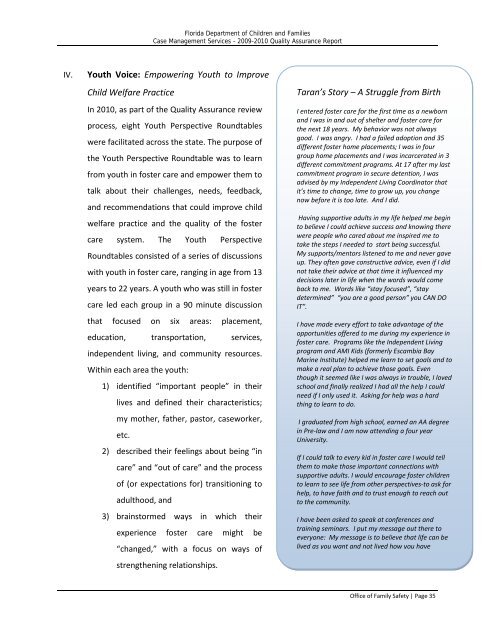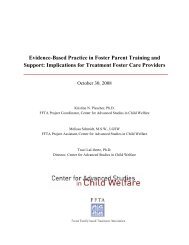Statewide Quality Assurance Report
Child Welfare Services Statewide Quality Assurance Report - Florida ...
Child Welfare Services Statewide Quality Assurance Report - Florida ...
- No tags were found...
Create successful ePaper yourself
Turn your PDF publications into a flip-book with our unique Google optimized e-Paper software.
Florida Department of Children and FamiliesCase Management Services - 2009-2010 <strong>Quality</strong> <strong>Assurance</strong> <strong>Report</strong>IV.Youth Voice: Empowering Youth to ImproveChild Welfare PracticeIn 2010, as part of the <strong>Quality</strong> <strong>Assurance</strong> reviewprocess, eight Youth Perspective Roundtableswere facilitated across the state. The purpose ofthe Youth Perspective Roundtable was to learnfrom youth in foster care and empower them totalk about their challenges, needs, feedback,and recommendations that could improve childwelfare practice and the quality of the fostercare system. The Youth PerspectiveRoundtables consisted of a series of discussionswith youth in foster care, ranging in age from 13years to 22 years. A youth who was still in fostercare led each group in a 90 minute discussionthat focused on six areas: placement,education, transportation, services,independent living, and community resources.Within each area the youth:1) identified “important people” in theirlives and defined their characteristics;my mother, father, pastor, caseworker,etc.2) described their feelings about being “incare” and “out of care” and the processof (or expectations for) transitioning toadulthood, and3) brainstormed ways in which theirexperience foster care might be“changed,” with a focus on ways ofstrengthening relationships.Taran’s Story – A Struggle from BirthI entered foster care for the first time as a newbornand I was in and out of shelter and foster care forthe next 18 years. My behavior was not alwaysgood. I was angry. I had a failed adoption and 35different foster home placements; I was in fourgroup home placements and I was incarcerated in 3different commitment programs. At 17 after my lastcommitment program in secure detention, I wasadvised by my Independent Living Coordinator thatit’s time to change, time to grow up, you changenow before it is too late. And I did.Having supportive adults in my life helped me beginto believe I could achieve success and knowing therewere people who cared about me inspired me totake the steps I needed to start being successful.My supports/mentors listened to me and never gaveup. They often gave constructive advice, even if I didnot take their advice at that time it influenced mydecisions later in life when the words would comeback to me. Words like “stay focused”, “staydetermined” “you are a good person” you CAN DOIT”.I have made every effort to take advantage of theopportunities offered to me during my experience infoster care. Programs like the Independent Livingprogram and AMI Kids (formerly Escambia BayMarine Institute) helped me learn to set goals and tomake a real plan to achieve those goals. Eventhough it seemed like I was always in trouble, I lovedschool and finally realized I had all the help I couldneed if I only used it. Asking for help was a hardthing to learn to do.I graduated from high school, earned an AA degreein Pre-law and I am now attending a four yearUniversity.If I could talk to every kid in foster care I would tellthem to make those important connections withsupportive adults. I would encourage foster childrento learn to see life from other perspectives-to ask forhelp, to have faith and to trust enough to reach outto the community.I have been asked to speak at conferences andtraining seminars. I put my message out there toeveryone: My message is to believe that life can belived as you want and not lived how you haveOffice of Family Safety | Page 35

















